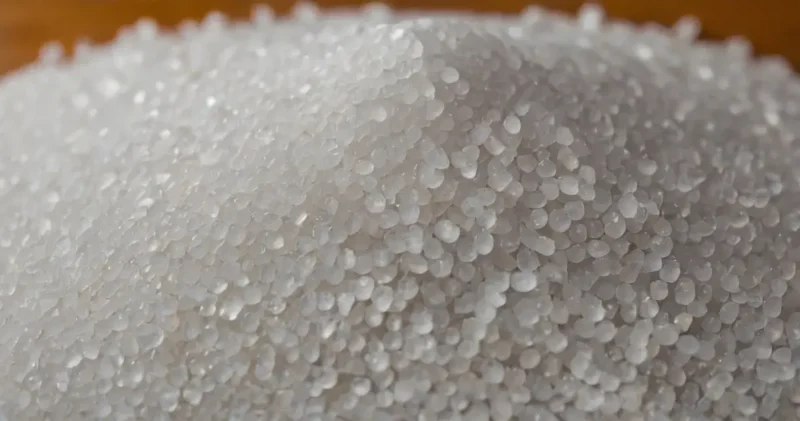
The market for sauerkrauts was estimated to be worth USD 10,857.4 million in 2022 and is expected to increase at a compound annual growth rate (CAGR) of 5.37% from 2023 to 2030, reaching USD 16,346.6 million.
The stats above show that sauerkraut is much popular and it holds a good market share in global trades. Now the question arises “Can dogs eat sauerkraut too?” or “Is the sauerkraut equally good for pets as humans?” The answer is yes, dogs can have sauerkraut but in minimal or moderate quantities. Feeding them in excess quantities can trigger serious health concerns.
The following article is accompanied with every detail regarding sauerkraut for dogs. To explore more, let’s get into this article.
Can Dogs Eat Sauerkraut?

Sharing my personal experience, one afternoon I opened a jar of sauerkraut to snack on. Within minutes, my dog approached me, wagging his tail and displaying eagerness to taste the sauerkraut. Reluctantly, I gave him about half a teaspoon, and to my surprise, he thoroughly enjoyed it. Despite his eagerness for more, I limited him to the same quantity and declined to give him any more. Over the next few days, I closely observed my dog, and fortunately, he showed no adverse reactions to the sauerkraut.
This changed my point of view to yes, dogs can eat sauerkraut.
Moral: Dogs can eat sauerkraut in minimal quantities or in moderation.
What Is Sauerkraut?
During the 18th century, German immigrants brought sauerkraut to the United States, where it became a popular dish, particularly in areas with large German populations, such as Pennsylvania. Today, sauerkraut is enjoyed worldwide and is not only used as a side dish but also as an ingredient in various recipes, such as sausages, stews, and sandwiches.
Sauerkraut is the fermented cabbage that is sour in taste. Although it didn’t originate in Germany but is still considered a national dish in Germany. Likewise, it is popular in central in some parts of Europe. To buy it at the most affordable prices, you can visit the link below or click at the image below:
Here is how to make sauerkraut:
- Shred the cabbage nicely.
- Mix it to salt and leave for fermentation. (the chemical breakdown of a substance by bacteria)
- The fermentation process is facilitated by lactic acid bacteria naturally present on the cabbage leaves.
- Over time, these bacteria convert the sugars in the cabbage into lactic acid, which preserves the cabbage and gives sauerkraut its characteristic sour flavor.
- You can click here for complete recipe.
The time required for fermentation of sauerkraut depends upon several factors i.e. the temperature, personal taste and other preferences. Normally it takes about 1-4 weeks.
What Are the Required Ingredients for Sauerkraut?
Sauerkraut is an economical dish and doesn’t require a lot of ingredients for its preparation but the timeframe it takes to obtain it’s actual sour taste is way too long. Let’s have a look at its ingredients:
- Cabbage: Cabbage is the most important ingredient. It is not possible to cook it without cabbage. You can use any type of cabbage, but white or green cabbage is most commonly used. Red cabbage can change color for the final product.
- Salt: Salt is the primary ingredient in its formation as it helps to draw out the moisture from the cabbage and provides an environment for fermentation.
- Other Optional ingredients: Cabbage and salt are the basic ingredients without which the dish cannot be prepared. Besides, there is are some optional ingredients too which one can add according to his/her personal preference. Let’s have a look at them:
- Caraway Seeds: Caraway seeds are slightly sweet and nutty in flavor. They are added in sauerkraut to enhance the tanginess of fermented cabbage.
- Juniper Berries: Juniper berries are peppery in taste. They can be added for a unique flavor.
- Other spices: Some people add spices like mustard seeds, dill seeds, or black pepper to enhance the flavor of the sauerkraut.
Nutritional Content in Sauerkraut
Sauerkraut, the simple German cabbage dish, is famous for its nutritional content. It holds a huge number of vitamins and minerals. Let’s have a look on them and their benefits for booth humans and animals.
- Vitamin A: Sauerkraut typically contains a moderate amount of vitamin A, that might be from the cabbage used in its preparation. Vitamin A is essential for vision, immune function, and skin health.
- Vitamin C: Sauerkraut is a good source of vitamin C, which is the most important vitamin for immune function, collagen production, and wound healing.
- Vitamin K: Sauerkraut contains vitamin K, which plays a crucial role in blood clotting and bone health. It contains minimal amount of vitamin K2.
- Calcium: Sauerkraut possess small amount of calcium. Calcium is an essential mineral that plays a critical role in bone health, muscle function, nerve transmission, and hormone secretion.
- Fiber: Sauerkraut is rich in dietary fiber, which is important for digestive health, regulating bowel movements, and supporting heart health.
- Iron: Iron is essential for of red blood cells production and oxygen transport in the body.
- Probiotics: Through the fermentation process, sauerkraut becomes a source of probiotics, which are good for gut health and digestion.
- Potassium: Potassium is an essential mineral maintains fluid balance, nerve function, muscle contractions, and blood pressure regulation.
Why is Sauerkraut Good for Dogs?
Due to its richness in nutritional content, it does offer a number of health benefits to dogs as it offers for human beings. But one thing we have to remember is feeding it in excess can trigger adverse effects too. Let’s explore the major health benefits of sauerkraut for dogs.
Gastrointestinal Health
As discussed above, sauerkraut contains good amount of dietary fiber which is essential for digestive health. Fiber bulks up stool, promotes regular bowel movements and avoids constipation and diarrhea. It also regulates flow of food through the digestive system, reducing bloating and gas.
Cardiovascular Health
The good stuff in sauerkraut, like Lactobacillus (say: lac-to-bacillus), might help older or chunky pups lower their bad cholesterol. It is believed that probiotics prevent cholesterol from being absorbed in the intestines, causing the body to excrete it.
Anti-inflammation Properties
Sauerkraut, like other fermented vegetables, is rich in phytonutrients. These plant-based compounds act as antioxidants, which can help reduce inflammation throughout the body. Chronic inflammation is linked to various skin problems in dogs, so phytonutrients might offer some relief.
The impact of sauerkraut on skin and coat likely comes from its influence on gut health and absorption of beneficial nutrients. It’s not a direct anti-inflammatory effect on the skin itself.
Nutrient Absorption
Organic acids, such as lactic acid in sauerkraut, are produced during fermentation. The “bioavailability” of several minerals, such as calcium and iron, can be increased by these acids. The term “bioavailability” describes a nutrient’s ease of absorption and utilization by the body. In your dog’s digestive tract, sauerkraut may improve the absorption of these nutrients by increasing their bioavailability.
The fermentation process might also introduce enzymes that break down some nutrients in sauerkraut itself, making them more readily available for absorption
Weight Management
The probiotics in sauerkraut helps in maintaining a healthy gut microbiota, which may improve nutrient absorption. As a result, your dog may not ask for more food because they are getting greater nutrients from their meals.
Studies indicate a link between managing weight and gut health. Weight control may be aided by a balanced gut flora, which may affect how the body stores and uses energy.
Bones and Teeth
The vitamin K2 in sauerkraut helps in making the bones a little stronger but it’s contribution in making strong bones can be ignored because your dog fulfils its major nutrient requirements for bone growth from its routine diet chart. The biggest source is meat.
Can Sauerkraut be Beneficial for Dog’s Gut Health?
While sauerkraut is lauded for its probiotic properties in humans, its benefits for canine gut health are less certain. Dogs have their own unique digestive systems, and while some may tolerate sauerkraut well, it’s not a guaranteed solution for every pup. Before incorporating sauerkraut into your dog’s diet, consult with your veterinarian to ensure it aligns with their specific needs and dietary requirements. Remember, what works wonders for one tummy might not sit so well with another!
Why is Sauerkraut Bad for Dogs?
An average serving of sauerkraut is about 1 cup or 200 grams. Commercially prepared sauerkraut contains around 1400-1500 milligrams of sodium per 200-gram serving. On the contrary, the amount of sodium recommended by most veterinarians for a healthy dog is about 100 milligram of sodium per kilogram of weight per day.
For example, if you have a 10-kilogram (22-pound) dog, their daily sodium intake should ideally not exceed 1000 milligrams (1 gram) of sodium. This shows that amount of sodium in a serving of sauerkraut doesn’t falls near the recommended amount of sodium for your canine.
This shows that feeding excess amount of sauerkraut to your dog can trigger serious health issues like sodium poisoning, digestive upset and other minor health issues too.
Whole pieces of sauerkraut can be a cause of choking hazard for your dog. Chop it up finely before feeding it to your furry friend.
I have analyzed from my personal experience that feeding sauerkraut to your dog in minimal or moderate quantities doesn’t trigger any health concerns.
Can Sauerkraut Cause Flatulence in Dogs?
Yes, sauerkraut can potentially cause flatulence in dogs. While small amounts of sauerkraut might not necessarily cause any issues, larger amounts could lead to digestive upset, including gas and bloating. Additionally, sauerkraut often contains high levels of salt, which can also be harmful to dogs in large quantities. It’s generally best to avoid giving sauerkraut to dogs and instead focus on dog-friendly foods and treats recommended by veterinarians.
Should Sauerkraut be Served Alone Or Mixed With Other Foods for Dogs?
If you’re considering serving sauerkraut to your dog, it’s generally best to serve it plain and in small amounts as a treat or occasional addition to their regular diet. Mixing sauerkraut with other foods might make it more palatable for some dogs, but it’s important to avoid adding ingredients that could be harmful, such as excessive salt or seasonings.
Always monitor your dog’s reaction to new foods, including sauerkraut, and introduce it gradually to assess their tolerance. Overall, sauerkraut should be considered as an occasional treat rather than a staple in a dog’s diet, and it’s important to prioritize a balanced and nutritionally complete diet specifically formulated for dogs.
Flavors and preferences
Sauerkraut is not restricted to one flavor only. There are a number of commercial varieties you would find at superstores and grocery markets in different flavors varying from region to region. Most popular commercial varieties are:
- Classic: Made with white cabbage, offering the standard sour and salty taste.
- Red Cabbage: Similar to classic sauerkraut but uses red cabbage for a slightly sweeter and tangier profile.
- Garlic: Chopped garlic adds a pungent kick to the classic sauerkraut.
- Caraway Seed: Aromatic caraway seeds add a licorice-like warmth to the sauerkraut.
- Dill Pickle: Dill adds a distinctive flavor reminiscent of dill pickles, alongside the sauerkraut’s tang.
Here is an interesting fact. The market share of only classic and red cabbage sauerkraut is more than 75 percent of the total market of sauerkraut. Some customized flavors are:
- Spicy: Add chili flakes or jalapenos for a fiery kick.
- Fruity: Apples, cranberries, or other fruits can add sweetness and complexity.
- Herbs: Fresh herbs like dill, thyme, or bay leaves can add unique taste profiles.
Feeding only classic sauerkraut and red cabbage sauerkraut is recommended for dogs. Other flavors contain additives that might be toxic for your dog.
When to Consult vet?
If you are desperate to feed your dog with sauerkraut, I would personally recommend to never allow your dog even lick it without your vet’s consultation. In most cases vets allow feeding your dog with sauerkraut and prescribe you a certain maximum quantity. However, if you have made the mistake and fed your dog with sauerkraut and now the dog is not behaving normal, follow the following steps:
- Observe your dog closely for 48 hours.
- List the changes you observe.
- If he behaves awkward, immediately visit a vet.
How To Feed Sauerkraut to Dogs?
Feeding sauerkraut to dogs can be a beneficial way to introduce probiotics into their diet and support their digestive health. However, it’s essential to do so in moderation and with care. Here’s a step-by-step guide on how to feed sauerkraut to dogs safely:
- Choose the Right Sauerkraut: Select plain sauerkraut without any added seasonings, spices, or preservatives.
- Introduce Gradually: If your dog has never eaten sauerkraut before, introduce it gradually into their diet. Begin with a small amount, such as a teaspoon, mixed with their regular food.
- Observe for Any Reactions: Monitor your dog closely after introducing sauerkraut into their diet. Watch for any signs of adverse reactions, such as digestive upset, diarrhea, or allergic reactions. If you notice any negative effects, discontinue feeding sauerkraut immediately and consult your veterinarian.
- Control Portion Sizes: Sauerkraut is beneficial in small amounts for your dog only, it should not make up a significant portion of your dog’s diet.
- Consider Homemade Sauerkraut: You can make sauerkraut at home with less sodium contents to make it more suitable for your dog.
- Consult with Your Veterinarian: Before making any significant changes to your dog’s diet, including the introduction of sauerkraut, it’s always best to consult with your veterinarian.
Can Dogs Eat Sauerkraut With Caraway Seeds?
It’s best to feed your dog plain sauerkraut without any additives or seasonings. Caraway seeds are small, crescent-shaped seeds with a distinct earthy, slightly sweet flavor and aroma. They are commonly used as a spice in cooking, particularly in European cuisine. Since products like onion, organic, chocolate and sugars are toxic for dogs, caraway seeds are also not suitable for his diet. They can trigger some health issues.
Alternatives to Sauerkraut That Dogs Can Eat
Here a few alternatives that you can feed your dog instead of sauerkraut:
| SR.NO | ALTERNATIVE | DETAIL |
|---|---|---|
| 1. | Plain Yoghurt | Plain, unsweetened yogurt can provide probiotics and support digestive health in dogs. |
| 2. | Pumpkin Puree | Pumpkin puree is high in fiber and can help with digestive issues such as diarrhea or constipation. |
| 3. | Cooked vegetables | Carrots, green beans and sweet potatoes can be healthy for your dog. |
| 4. | Apples | Apples, when sliced and without seeds, provide vitamins and fiber, but ensure to remove seeds as they contain cyanide which is harmful to dogs. |
| 5. | Blueberries | Blueberries are rich in antioxidants and fibers that are good for your dog. |
| 6. | Boiled chicken | Plain boiled chicken is rich in protein that helps in muscle growth. |
| 7. | Rice | Cooked plain rice can help soothe upset stomach. |
| 8. | Cottage cheese | Small amount of cottage cheese are good source of calcium and proteins for your dog. |
Conclusion
In conclusion, I must end with there are many human foods that our feline and canine fellows can eat but only in moderation. Since dog’s digestive system is not same as humans, we must consult our vet before introducing any new thing to our dog’s diet. Yes, dogs can eat sauerkraut and it do offers some potential health benefits to your dog but only when fed in moderation. Feeding in excess may lead to sodium poisoning and other serious health issues.
Will feel delighted to find you reading our other articles too on dog’s dietary issues. Here are links for a few of them.
FREQUENTLY ASKED QUESTIONS
Revealing a Secret: Can Dogs Eat Cow Hooves? 7+ Causes









2 thoughts on “Can Dogs Eat Sauerkraut? A Detailed Guide”